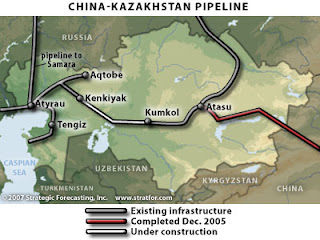 The unexpected and sudden renewal of the Turkmen-Azerbaijani dispute over three hydrocarbon fields in the middle of the Caspian Sea is the latest setback to the European Union's Nabucco gas-pipeline project.
The unexpected and sudden renewal of the Turkmen-Azerbaijani dispute over three hydrocarbon fields in the middle of the Caspian Sea is the latest setback to the European Union's Nabucco gas-pipeline project.An argument over ownership of the Caspian fields had soured Turkmen-Azerbaijani relations for more than a decade. But over the last two years, representatives of the two countries -- prodded by EU and U.S. officials -- had been meeting regularly, reviving hopes that Nabucco could be realized.
Those hopes took a hit on July 24 when Turkmen President Gurbanguly Berdymukhammedov cited a report from Deputy Foreign Minister Toyly Komekov during a cabinet meeting.
Berdymukhammedov said the report showed that the impasse over the demarcation of the Caspian seabed between the two countries has remained unresolved "due to Azerbaijan's specific position. The main reason behind this situation is that there are mineral deposits located exactly in the disputed areas of the Caspian Sea. Azerbaijan claims ownership of these deposits, including the deposit known as Promezhutochnoyee during the Soviet era and which we now call our Serdar deposit."
Berdymukhammedov went on to mention the Omar and Osman fields, which he said Azerbaijan is already exploring but which, he claimed, "belong to us." The Turkmen president expressed regret that 16 bilateral meetings had not resolved the issue and then instructed Foreign Minister Rashid Meredov to take the issue to "the International Court of Arbitration."
That could present a major obstacle to the European Union's Nabucco plans. The proposed 3,300-kilometer pipeline starts at Georgia's western border and then heads toward Europe via Turkey. Nabucco wants to include Central Asian gas in the pipeline, particularly gas from Turkmenistan, which has one of the world's largest reserves of natural gas.
For some 15 years now the plan was to construct a "trans-Caspian" pipeline along the Caspian seabed from Turkmenistan to Azerbaijan, where it would be join a pipeline leading to Georgia's western border. But the dispute between Ashgabat and Baku over ownership of the three Caspian fields made construction of this pipeline impossible.
The recent warming of ties between the two countries, including a visit by Berdymukhammedov to Baku last year, raised hopes the pipeline could finally be built.
On state television on July 25, Deputy Foreign Minister Xalaf Xalafov indicated Azerbaijan was prepared to have a court decide on the ownership issue. "We believe that we are ready to defend Azerbaijan's position and rights on all levels," Xalafov said.
Ilham Shaban, an Azerbaijan-based energy expert and the editor of the "Turan Energy" daily newsletter, tells RFE/RL's Turkmen Service that after years of this dispute, a court ruling may be the most "civilized" means of ending the stalemate.
"And to take this matter before a court is a natural step and we also hope the court will render a fair verdict," Shaban says.
Shaban adds that a resolution of the ownership question could then pave the way for dramatic improvement in Turkmen-Azerbaijani ties, which in turn opens up the way for projects like Nabucco. Nabucco foresees that the lion's share of the proposed 31 billion cubic meters of gas for the pipeline would come from Turkmenistan.
"I feel that this court will render a decision that will bring our countries even closer together if Ashgabat and Baku will observe and accept the decision of the International Arbitration Court," he says.
Shaban concedes that if the two countries do not show flexibility and maintain the rigid posturing that has marred bilateral ties for so long, the court case could drag on for years and endanger the construction of the trans-Caspian pipeline and also Nabucco.
(rferl)





